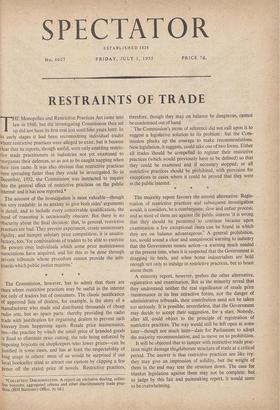RESTRAINTS OF TRADE
THE Monopolies and Restrictive Practices Act came into, law in 1948; but the investigating Commission then set up did not have its first real test until four years later. In its early stages it had been reconnoitring individual trades where restrictive practices were alleged to exist; but it became clear that its reports, though useful, were only enabling restric- tive trade practitioners in industries not yet examined to reorganise their defences, so as not to be caught napping when their turn came. It was also obvious that restrictive practices Were spreading faster than they could be investigated. So in December, 1952, the Commission was instructed to inquire into the general effect of restrictive practices on the public interest: and it has now reported.* The account of the investigation is most valuable—though not very readable: in its anxiety to give both sides' arguments in detail, and to include every conceivable qualiffcation, the trend of reasoning is occasionally obscure. But there is no obscurity about the final decision: that, in general, restrictive Practices are bad. They prevent experiment, create unnecessary rigidity, and hamper salutary price competition; it is unsatis- factory, too, 'for combina'tiona of traders to be able to exercise the powers over individuals which some price maintenance associations have acquired, and for this to be done through, Private tribunals whose procedure cannot provide the safe- guards which public justice requires.'
The Commission, however, has to admit that there are Cases where restrictive practices may be useful in the interest not only of traders but of consumers. The classic justification of approved lists of dealers, for example, is the story of a rnanufacture,r who made and distributed thousands of cheap radio sets, but no spare parts: thereby providing the radio trade with justification for organising dealers to prevent such knavery from happening again. Resale price maintenance, too--the practice by which the retail price of branded goods is fixed to eliminate price cutting, the rule being enforced by imposing boycotts on shopkeepers who loNiver prices—can be instilled in some cases, and has at least the respectability of long usage in others: most of us would be surprised if our local bookseller tried to attract our custom by clipping a few Pence off the stated price of novels. Restrictive practices, *COLLECTIVE DISCRIMINATION. A report on exclusive dealing, collec- tive boycotts, aggregated rebates and other discriminatory trade prac- tices. (HM Stationery Office, 3s. 6d.) therefore, though they may on balance be dangerous, cannot be condemned out of hand.
The Commission's terms of reference did not call upon it to suggest a legislative solution to its problem : but the Com- mission plucks up the courage to make recommendations. New legislation, it suggests, could take one of two forms. Either all trades -Should be compelled to register their restrictive practices (which mould previously have to be defined) so that they could be examined and if necessary stopped; or all restrictive practices should be prohibited, with provision for exceptions in cases where it could be proved that they were in the public interest.
The majority report favours the second alternative. Regis- tration of restrictive practices and subsequent investigation would, it considers, be a cumbersome, slow and unfair process; and as most of them are against the public interest 'it is wrong that they should be permitted to continue because upon examination a few exceptional Cases can be found in which they are on balance advantageous.' A general prohibition, too, would sound a clear and unequivocal warning to industry that the Government means action—a warning much needed at the present time, when it is suspected that the Government is dragging its heels, and when home industrialists are bold enough not only to indulge in restrictive practices, but to boast about them.
A minority report, however, prefers the other alternative, registration and examination. But as the minority reveal that they understand neither the real significance of resale price maintenance in its less attractive forms, nor the danger of administrative tribunals, their contribution need not be taken too seriously. It is possible, nevertheless, that the Government may decide to accept their suggestion, for a start. Nobody, after all, could object to the principle of registration of restrictive practices. The way would still be left open at some later—though not much later—date for Parliament to adopt, the majority recommendation, and to move on to prohibition.
It will be objected that to tamper with restrictive trade prac- tices might damage theflaborate structure of trade at a critical period. The answer is that restrictive practices are like ivy: they may give an impression of solidity, but the weight of them in the end may tear the structure down. The case for blanket legislation against them may not be complete; but to judge by this fair and painstaking report, it would seem to be overwhelming.














































 Previous page
Previous page